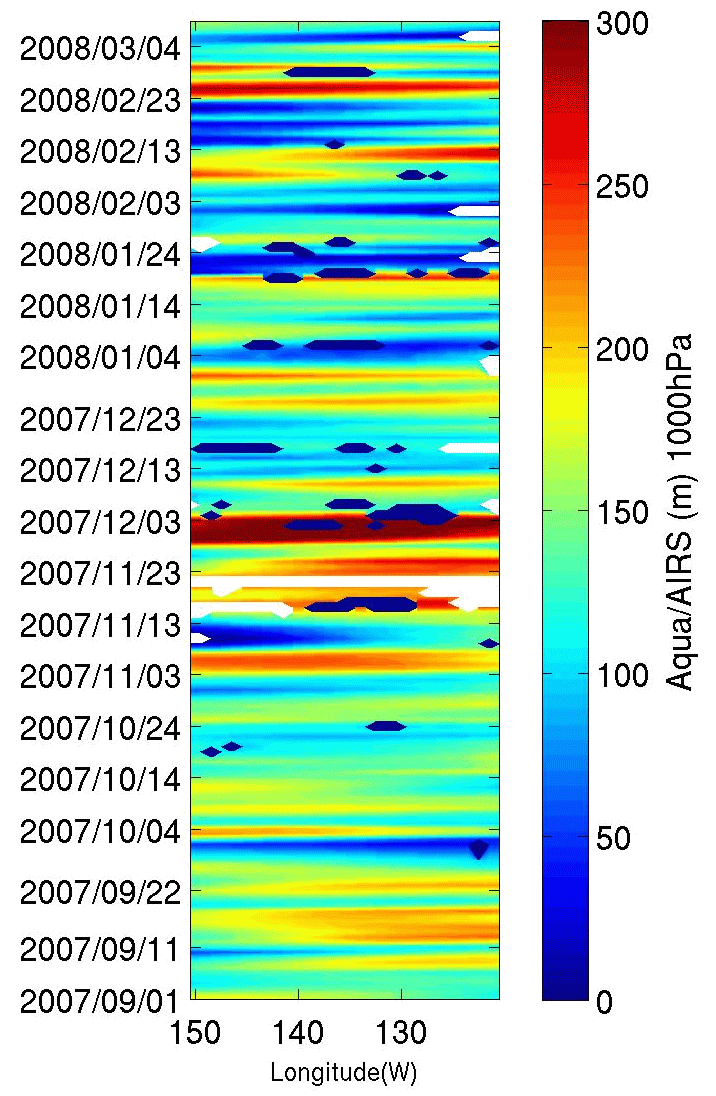3.経度-時間プロット 断面図作成にも通じるやり方
slon=210 ; elon=240 ; slat=75 ; elat=75 ;<------75°N、150W-120Wを指定
oflj=['./GPHinCB20072008WIN','-',num2str(slon),'-',num2str(elon),'-',num2str(slat),'-',num2str(slat),'.jpg'];
dirData = dir('*GPH.mat'); %# Get the data for the current directory
dirIndex = [dirData.isdir]; %# Find the index for directories
fileList = {dirData(~dirIndex).name}'; %'# Get a list of the files
[x y]= size(fileList);
for i=1:x
ft = fileList(i); filename=ft{1}
load(filename);
ind=find(lon < 0) ; lon(ind)=lon(ind)+360; clear indl;
year0=str2num(filename(6:9)); mo0=str2num(filename(11:12)); dd0=str2num(filename(14:15));
sx=find(lon(:,1) >= slon-0.5 & lon(:,1) < slon+0.5);
ex=find(lon(:,1) >= elon-0.5 & lon(:,1) < elon+0.5);
ey=find(lat(1,:) >= slat-0.5 & lat(1,:) < slat+0.5);
sy=find(lat(1,:) >= elat-0.5 & lat(1,:) < elat+0.5);
GPH0=GPHA(:,:,1); % @1000hPa
GPH1=GPH0(sx:ex,sy:ey); clear GPH0; <-------指定範囲内のデータを切り取り
lon1=lon(sx:ex,sy:ey); clear lon<-------指定範囲内のデータを切り取り

GPHF=GPH1; lonf=lon1;
year=year0; mo=mo0; dd=dd0;
else
GPHF=[GPHF GPH1] ; lonf=[lonf lon1] ;<-------どんどん足していく、実はlonfのところはもっと賢い方法がある
year=[year' year0']' ; mo=[mo' mo0']' ; dd=[dd' dd0']' ;<-------どんどん足していく
end
end
vmin=0; vmax=300; labp=vmin:5:vmax;
date=(datenum(year,mo,dd)); lonaxis=lonf(:,1);<-------X軸、Y軸のデータ
ind=find(lonaxis > 180); lonaxis(ind)=-1.0*(lonaxis(ind)-360); clear ind;
ind=find(GPHF == -9999) ; GPHF(ind)=NaN; clear ind;
figure
contourf(lonaxis',date',GPHF',labp); shading flat ; hold on ; caxis([vmin vmax]);<--X,Y軸のデータを指定して描画
h=colorbar; % カラーバー
set(get(h,'ylabel'),'String','Aqua/AIRS (m) 1000hPa','fontsize',12);
set(gca,'Ytick',date(1:10:end))
datetick('y','yyyy/mm/dd','keeplimits','keepticks');
set(gca,'XDir','rev') ;<------軸の反転
xlabel('Longitude(W)');
set(gca,'FontSize',20);
% axis equal;
hold off
daspect([15 30 1])
print('-djpeg','-r200',oflj);